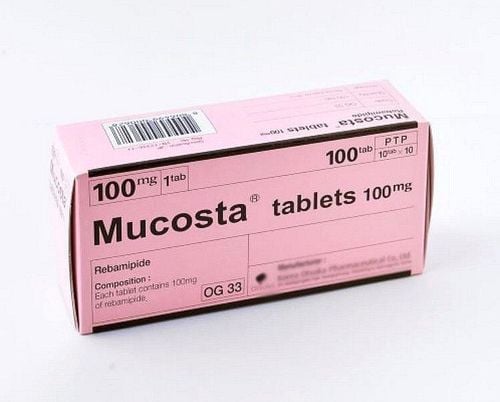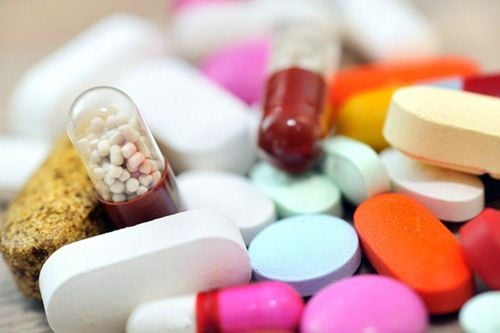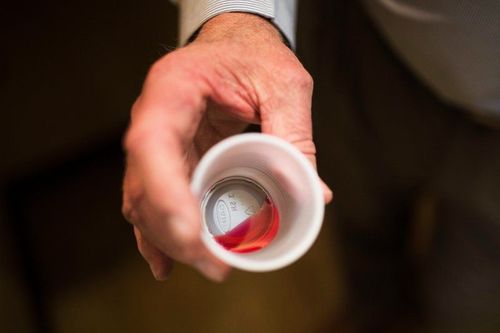This is an automatically translated article.
Stomach ulcer is a very common disease in today's life, besides conventional treatment drugs such as proton pump inhibitors, H2 antagonists... patients can use it in combination with Bismuth in the drug. Bismatrol. So what is Bismatrol and how does it work?
1. What is Bismatrol?
Bismatrol contains the active ingredient Bismuth Subsalicylate. So what does Bismatrol treat? Bismatrol is commonly used in the treatment of heartburn, some digestive disorders such as diarrhea, nausea, bloating or to relieve symptoms of stomach ulcers.2. Instructions for using Bismatrol
Bismatrol is often used in combination with certain other medicines to treat stomach ulcers caused by the bacteria Helicobacter pylori. However, patients should not arbitrarily use Bismatrol to treat stomach ulcers. Bismatrol contains the active ingredient Bismuth Subsalicylate (a member of the salicylate class of active ingredients), which can cause serious problems with stomach bleeding when used alone in patients with existing ulcers.
Patients should take Bismatrol by mouth and follow the instructions on the product packaging or specific instructions of the doctor.
The dose of Bismatrol used depends on the age, health status and ability to respond to treatment of each patient. Therefore, patients absolutely should not increase the dose or increase the frequency of using Bismatrol compared to the instructions for use, and at the same time, do not exceed the recommended dose of Bismatrol according to the user's age.
When using any medicine, including Bismatrol, patients need to carefully read the instructions for use of the drug, because each different product will have very different instructions for using the drug.
Bismatrol is in the form of chewable tablets, so patients need to chew each tablet thoroughly before swallowing.
Bismatrol can interact with some other drugs (such as Tetracycline or Chloroquine antibiotics) and lead to the patient's body not being able to fully absorb the drug. Patients should discuss with their doctor or pharmacist how to use these drugs together with Bismatrol to prevent adverse interactions.
If the doctor instructs to use Bismatrol daily, patients should use it regularly and regularly to achieve the highest treatment effect. At the same time, while taking the drug, regularly inform your doctor about your condition. If you are taking Bismatrol for diarrhea, tell your doctor if the diarrhea persists for more than 2 days.
Patients should not use Bismatrol if there is a history of allergy to Bismuth Subsalicylate or the following problems:
Black or bloody stools; Having a stomach ulcer ; Have a blood clotting disorder or blood loss; History of allergy to other salicylates such as Aspirin, Salflex, Tricosal. Bismatrol should never be given to children or adolescents with fever and flu or chickenpox symptoms, as salicylates can cause Reye's syndrome - a serious and potentially fatal condition in children.
3. Bismatrol side effects
Patients should immediately notify the doctor if the course of taking Bismatrol appears signs of an allergic reaction such as hives, difficulty breathing, swelling of the face, lips, tongue or throat... or have the following undesirable effects:
Nausea and vomiting are more severe; Hearing loss/loss or tinnitus; Diarrhea lasts more than 2 days; Stomach symptoms are more severe; Constipation; Dark stools. Bismatrol may cause a patient's tongue to turn black or dark. However, this is a harmless side effect.
The effects listed above are not a complete list of unwanted effects when using Bismatrol medicine. If patients experience any unusual symptoms while taking this product, please contact your doctor or pharmacist for advice or adjust the way to take Bismatrol more suitable.
4. Bismatrol drug interactions
Drug interactions can affect how drugs work, change the effects of treatment, or increase the risk of serious side effects. Therefore, patients should share a list of all the products they are using with their doctor before taking Bismatrol to be fully advised of the potential risks of interactions. At the same time, patients should not arbitrarily take, stop or increase or decrease the dose of any medicine without the permission of the doctor or pharmacist.
Before using Bismatrol, the doctor or pharmacist should know about all the drugs the patient is taking, especially Valproic Acid, Carbonic Anhydrase Inhibitors (such as Acetazolamide), Corticosteroids (such as Prednisone), Chlorpheniramine and Methotrexate.
Non-steroidal anti-inflammatory drugs (NSAIDs) such as Aspirin, Ibuprofen or Naproxen... if used together with Bismatrol can increase the risk of side effects.
Bismatrol may interfere with and affect the results of the contrast-enhanced abdominal X-ray. Therefore, the patient needs to make sure that the radiologist and the doctor know that the patient is taking this medication.
This article does not list all possible drug interactions associated with Bismatrol. Therefore, to ensure patient safety discuss with your doctor or pharmacist all drug interactions associated with this preparation.
In order for the use of Bismatrol to be most effective, in addition to following the instructions, patients also need to pay attention to change their diet, lifestyle and rest so that the disease is improved according to the instructions. best direction.
Follow Vinmec International General Hospital website to get more health, nutrition and beauty information to protect the health of yourself and your loved ones in your family.
Please dial HOTLINE for more information or register for an appointment HERE. Download MyVinmec app to make appointments faster and to manage your bookings easily.
Reference source: drugs.com













